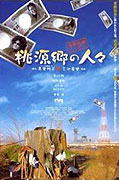
Director:
Takashi MiikeCámara:
山本英夫Música:
Kōji EndōReparto:
Shō Aikawa, Houka Kinoshita, Shiro Sano, Midoriko Kimura, Yu Tokui, 室井滋, Toshiki Ayata, Akaji Maro, 日野陽仁, 芦屋小雁Reseñas (1)
Shangri-La provides further proof that the perception of Miike as a director who delights in perversity and violence was extremely limited even at the time of his greatest fame. Miike is simply a creative director who can imaginatively bring any screenplay to life (he has only ever written one screenplay himself, when the screenwriter got sick; otherwise he has made films based on other people’s screenplays and ideas). In Shangri-La, he has thus created a social comedy that subtly celebrates the solidarity of ordinary people against the all-consuming power and heartlessness of the capitalist system. The tale of a wise and resourceful leader of a homeless community who, together with a writer whose inspiration has abandoned him, saves a small businessman from insolvency can make an almost classical impression. After all, the film’s playful depiction of a group of people from the fringes of society resembles Kurosawa’s Dode's-Ka Den, but we will also find here allusions to the iconic compositions of people on the banks of the river in Yasujiro Ozu’s films. We can find Miike’s creative signature in the film in the overall exaggeration and levity, which is apparent primarily in the various satirical moments. In addition to that, the film features actors who frequently collaborate with Miike, particularly Sho Aikawa, a famous portrayer of tough cops and yakuza gangsters from B-movies, who plays the atypical comedic role of the protagonist. The shooting of scenes on busy streets without in any way hindering the movements of passers-by is another typical trait of the film.
()